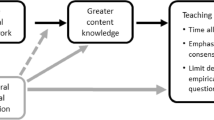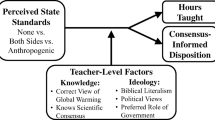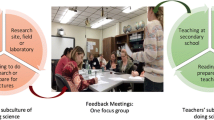Abstract
Misconceptions about climate change science are pervasive among the US public. This study investigated the possibility that these misconceptions may be reflective of science teachers’ knowledge and teaching of climate change science. Florida and Puerto Rico secondary science teachers who claim to teach extensively about climate change were surveyed in regard to their conceptions of climate change science and the climate change-related topics they teach. Results show that many teachers hold naïve views about climate change (e.g. that ozone layer depletion is a primary cause of climate change) and climate change science (e.g. that it must be based on controlled experiments for it to be valid). In addition, teachers in both groups neglect crucial topics such as how evidence for climate change is developed and the social, political, and economic dimensions of climate change. Our results suggest the need for teachers to understand how to teach climate change and the nature of climate change science using authentic contexts that promote effective socioscientific decision-making and climate change mitigation.


Similar content being viewed by others
References
American Association for the Advancement of Science (AAAS) (2007). Communicating and learning about climate change: An abbreviated guide for teaching climate change, from Project 2016 at AAAS. Retrieved Novmenber 11, 2014 from: http://www.aaas.org/program/project2061.
Bartholomew, H., Osborne, J. & Ratcliffe, M. (2004). Teaching students “ideas‐about‐science”: Five dimensions of effective practice. Science Education, 88(5), 655–682.
Boesch, D. F., Field, J. C. & Scavia, D. (Eds.) (2000). The potential consequences of climate variability and change on coastal areas and marine resources-report of the coastal areas and marine resources sector team, U.S. national assessment of the potential consequences of climate variability and change, U.S. global change research program. (NOAA Coastal Ocean Program Decision Analysis Series No. # 21). Silver Spring, MD: NOAA Coastal Ocean Program.
Bord, R. J., O’Connor, R. E. & Fisher, A. (1998). Public perceptions of global warming: United States and international perspectives. Climate Research, 11(1), 75–84.
Borisova, T., Breuer, N., & Carriker, R. (2008). Economic impacts of climate change on Florida: Estimates from two studies. (Report No. FE787). Gainesville, FL: EDIS and University of Florida-IFAS.
Bueno, R., Herzfeld, C., Stanton, E. A. & Ackerman, F. (2008). The Caribbean and climate change: The costs of inaction. Medford, MA: Tufts University.
Choi, S., Niyogi, D., Shepardson, D. P. & Charusombat, U. (2010). Do earth and environmental science textbooks promote middle and high school students’ conceptual development about climate change? Textbooks’ consideration of students’ misconceptions. Bulletin of the American Meteorological Society, 91(7), 889–898.
Cohen, D. K. (1991). A revolution in one classroom. Educational Evaluation and Policy Analysis, 12(3), 327–345.
Cohen, L., Manion, L. & Morrison, K. (2011). Research methods in education (7th ed.). New York, NY: Routledge.
Conover, W. J. (1999). Practical nonparametric statistics (3rd ed.). New York, NY: John Wiley & Sons.
Dawson, V. (2012). Science teachers’ perspectives about climate change. Teaching Science, 58(3), 8–13.
DeVellis, R. F. (2003). Scale development: Theory and applications (2nd ed.). Thousand Oaks, CA: Sage.
Dunning, D., Johnson, K., Ehrlinger, J. & Kruger, J. (2003). Why people fail to recognize their own incompetence. Current Directions in Psychological Science, 12(3), 83–87.
Herman, B.C. (2013). Convergence of Postman and Vygotsky's perspectives regarding contemporary media's impact on learning and teaching. Chapter 15. In M. P. Clough, J. K. Olson & D. S. Niederhausers (Eds.), The Nature of Technology: Implications for Teaching and Learning (pp. 293–328). Rotterdam, The Netherlands: Sense.
Herman, B.C. (2015). The Influence of global warming science views and sociocultural factors on willingness to mitigate global warming. Science Education, 1(1), 1–38.
Hestness, E., McDonald, R. C., Breslyn, W., McGinnis, J. R. & Mouza, C. (2014). Science teacher professional development in climate change education informed by the Next Generation Science Standards. Journal of Geoscience Education, 62(3), 319–329.
Hodges, B., Regehr, G. & Martin, D. (2001). Difficulties in recognizing one’s own incompetence: Novice physicians who are unskilled and unaware of it. Academic Medicine, 76(Supl. 10), S87–S89.
Hodson, D. (2009). Teaching and learning about science: Language, theories, methods, history, traditions and values. Boston, MA: Sense Publishers.
Intergovernmental Panel on Climate Change (IPCC). (2007a). Climate change 2007: Synthesis report. Contribution of working groups I, II and III to the fourth assessment report of the Intergovernmental Panel on Climate Change. Geneva, Switzerland: IPCC.
Intergovernmental Panel on Climate Change (IPCC). (2007b). Climate change 2007: The physical science basis. Contribution of working group I to the fourth assessment report of the Intergovernmental Panel on Climate Change. United Kingdom: Cambridge University Press.
Intergovernmental Panel on Climate Change (IPCC) (2007c). Climate change 2007: Working Group I: The physical science basis. 7.4.6 stratospheric ozone and climate. Retrieved August 11, 2015, from https://www.ipcc.ch/publications_and_data/ar4/wg1/en/ch7s7-4-6.html.
Intergovernmental Panel on Climate Change (IPCC). (2013). Climate change 2013: The physical science basis. Contribution of working group I to the fifth assessment report of the Intergovernmental Panel on Climate Change. United Kingdom: Cambridge University Press.
Jamieson, S. (2004). Likert scales: How to (ab)use them. Medical Education, 38, 1212–1218.
Krosnick, J. A. (1991). Response strategies for coping with the cognitive demands of attitude measures in surveys. Applied Cognitive Psychology, 5(3), 213–236.
Leiserowitz, A., Maibach, E., Roser-Renouf, C. & Hmielowski, J. (2012). Global warming’s six Americas, March 2012 & Nov. 2011. New Haven, CT: Yale University & George Mason University.
Leiserowitz, A., Maibach, E., Roser-Renouf, C., Feinberg, G., Rosenthal, S. & Marlon, J. (2014). Climate change in the American mind: Americans’ global warming beliefs and attitudes in November, 2013. New Haven, CT: Yale University & George Mason University.
Lombardi, D. & Sinatra, G. M. (2013). Emotions about teaching about human-induced climate change. International Journal of Science Education, 35(1), 167–191.
Lombardi, D., Sinatra, G. M. & Nussbaum, E. M. (2013). Plausibility reappraisals and shifts in middle school students’ climate change conceptions. Learning and Instruction, 27, 50–62.
Mansour, N. (2013). Consistencies and inconsistencies between science teachers’ beliefs and practices. International Journal of Science Education, 17(3), 1230–1275.
Millan-Otoya, J. C. (2015) Understanding climate change and sea level: A case study of middle school student comprehension and an evaluation of tide gauges off the Panama Canal in the Pacific Ocean and Caribbean Sea (Master’s Thesis). University of South Florida, St. Petersburg, FL.
Monroe, M. C., Oxarart, A. & Plate, R. R. (2011). A role for environmental education in climate change for secondary science educators. Applied Environmental Education and Communication, 12, 4–18.
Next Generation Science Standards Lead States (2013). Next generation science standards: For states, by states. Washington, DC: The National Academies Press.
Puerto Rico Climate Change Council (PRCCC) (2013). State of Puerto Rico’s climate 2010–2013 executive summary. Assessing Puerto Rico’s social-ecological vulnerabilities in a changing climate. Retrieved on May 2, 2015 from http://www.drna.gobierno.pr/oficinas/arn/recursosvivientes/costasreservasrefugios/pmzc/prccc/prccc-2013/PRCCC_ExecutiveSummary_ElectronicVersion_English.pdf.
Reynolds, T. W., Bostrom, A., Read, D. & Morgan, M. G. (2010). Now what do people know about global climate change? Survey studies of educated laypeople. Risk Analysis, 30(10), 1520–1538.
Rudolph, J. L. (2007). An inconvenient truth about science education. Teachers College Record. Retrieved September 26, 2007 from http://www.tcrecord.org.
Sullivan, S. M. B., Ledley, T. S., Lynds, S. E. & Gold, A. U. (2014). Navigating climate science in the classroom: Teacher preparation, perceptions and practices. Journal of Geoscience Education, 62(4), 550–559.
Teed, R. & Franco, S. (2014). Increasing teachers’ confidence and pedagogical content knowledge through a workshop and follow-up program on climate change. Journal of Geoscience Education, 62(4), 587–597.
U.S. Census Bureau (2010). Coastline population trends in the United States: 1960 to 2008. Retrieved from http://www.census.gov/library/publications/2010/demo/p25-1139.html.
U.S. Global Change Research Program (USGCRP). (2009). Global climate change impacts in the United States. New York, NY: Cambridge University Press.
Wise, S. B. (2010). Climate change in the classroom: Patterns, motivations, and barriers to instruction among Colorado science teachers. Journal of Geoscience Education, 58(5), 297–309.
Acknowledgments
Contract grant sponsor: U.S. National Science Foundation funded CCEP-I: (NSF 10-542) Coastal Areas Climate Change Education (CACCE) Partnership Award (1043323).
Author information
Authors and Affiliations
Corresponding author
Additional information
We dedicate this article to the memory of Walter J. Rosales-Mejía whose intelligence and kindness supported us in this endeavor. Any opinions, findings, conclusions, and recommendations expressed in this article are those of the authors and do not necessarily reflect the views of the National Science Foundation.
Electronic supplementary material
Below is the link to the electronic supplementary material.
ESM 1
(DOCX 26 kb)
Rights and permissions
About this article
Cite this article
Herman, B.C., Feldman, A. & Vernaza-Hernandez, V. Florida and Puerto Rico Secondary Science Teachers’ Knowledge and Teaching of Climate Change Science. Int J of Sci and Math Educ 15, 451–471 (2017). https://doi.org/10.1007/s10763-015-9706-6
Received:
Accepted:
Published:
Issue Date:
DOI: https://doi.org/10.1007/s10763-015-9706-6




